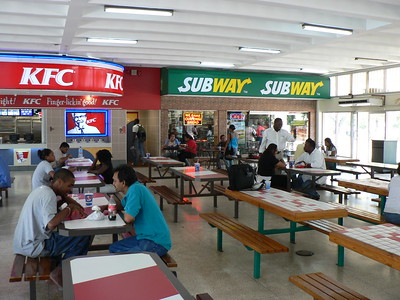Last week, Nassau Community College in Garden City, NY lost its food vendor, the Compass Group. The vendor supplied campus dining services to about 18,000 faculty, staff, and students.
According to NCC, the vendor left because it could not make ends meet under the terms of the current contract. The NCC Board of Trustees approved the five-year contract in April 2019, which has expired. At the March 2024 Board Meeting, the trustees approved a contract renewal with the Compass Group worth about $385,000. The Compass Group notified NCC in March that it did not intend to renew its contract with the college.
Campus dining contracts are revenue sources for colleges and universities, so the loss of the contract leaves the campus short on food and on projected revenues. The closure of the campus dining facilities came as a surprise to students and staff. According to NCC Vice President Jerry Kornbluth, Compass Group sought to have NCC pay for about $300,000 in vendor costs to remain on campus.
To be clear, the Compass Group is a giant, multinational corporation. The company reported net income of $1.62B in 2023.
Net income.
—> Net. <---
That was an increase of 13.1% over the company’s 2022’s net income.
The Compass Group is not hurting for money and wasn’t nickel-and-diming NCC for a few extra bucks. But it is entirely possible that continued dining services at NCC didn’t make economic sense for the company. Since 2019, when the contract was first signed, enrollment at NCC has declined by more than 27%. The number of credit hours has also shrunk. Since The Compass Group signed its contract with NCC, NCC’s credit hour delivery has declined by nearly 27%.
A good food vendor can draw in students
Naturally the faculty, staff, and students are unhappy. In one news item about the issue, a faculty member decried NCC administrators’ incompetence for failing to notify the campus community regarding the loss of the Compass Group and failing to plan to bring in temporary food vendors.
In my view, that’s not the real failure. The real failure is allowing the enrollment to dip so low that the college is no longer attractive to prospective on-campus vendors. Dining revenues depend on enrollment and in-person attendance.
If a community college located in an area not zoned to support campus oriented businesses were to focus on developing its online presence to the point of eliminating in-person classes, its vendors – like the dining supplier and the bookstore – could find it so financially unrewarding that they might drop that college altogether. (Not that THAT’s ever happened…)
And a campus that lacks recognizable dining facilities becomes unattractive to prospective students. It becomes just one more negative, and yet another reason NOT to enroll.
Just sayin’…
Photo Credit: gsdi10, via Flickr





















